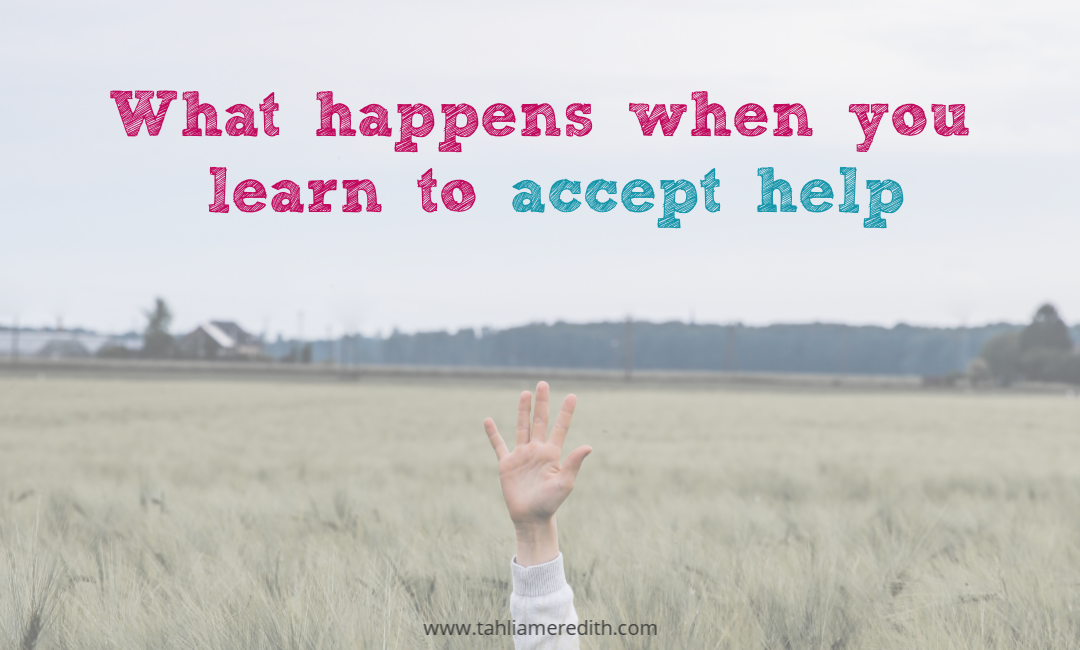Once upon a time, I was dating someone whose dad was generous to a fault – the first to pull out his wallet at a restaurant, offering to lend a hand when money was tight, and always ready to come over and help with odd jobs if you needed it.
His son inherited a similar financial generosity and they would often try to beat each other to pay on a night out. One night I took a leaf out of their book and, pretending to go to the bathroom, I snuck over and paid for everyone’s dinner. Somewhat surprisingly, his dad was pretty pissed off at me for doing so and ticked me off several times. Finally I asked him, why is it ok for you to take care of everyone else but we’re not allowed to take care of you? He was stumped.
It’s something I’ve reflected on fairly often over the years, because the way he acted is certainly not unique. We relish the opportunity to show our loved ones we care about them, and yet most of us are terrible at asking for (and accepting) help from others. (Then there are others who don’t even realise how much they take, but that’s a topic for another day).
Recently, a friend asked if I could pick her up from the airport quite late at night. Of course! I replied. It’ll give us the opportunity to catch up after your trip. A few weeks later I was travelling home and another friend offered to collect me from the airport; not only had it never occurred to me to ask someone to collect me, I resisted the offer at first because I didn’t want to inconvenience her. (Although I’m glad I eventually relented – getting home from the airport late at night is a pain!)
And when it comes to the bigger stuff, we’re even less likely to reach out. Last year I nearly drowned in the aftermath of the unpleasantness before asking for help, and even then it took a panic attack on a city tram to get me there.
So why are we so reluctant to let others know that we need their help?
For me, there were a few reasons. I felt like I should’ve been able to handle things on my own — I am a strong woman, after all. I didn’t want to inconvenience my friends; I didn’t want to burden them with my troubles, and I’ve always struggled to be vulnerable with people outside of my immediate family. And I didn’t want to be judged for the horrible thoughts and feelings I couldn’t ward off.
Here’s what I discovered though, when I finally gave in and opened up (read: was forced to because my face wouldn’t stop leaking in public…).
- People who love you are beyond willing to support you as you work through your troubles. Of course this should go without saying, but we get so tied up in our worry that we’ll be bothering people we lose sight of it.
- People have gone through the same thing you have, or at least something similar, so they can empathise with you. The right people will hold a safe space for you to share, and wail, and cry, and be irrational, and rage, and so much more, without judgement. Because they’ve been there too. And even if they haven’t, they love you, and that’s reason enough to hold space for you. (Related: my sister is now also known as ‘a safe receptacle for my ugly thoughts’).
- Talking makes it easier. I’m not sure why it works, but somehow letting things out makes them less powerful and/or scary. I would sometimes end up laughing at how ridiculous I sounded when I gave voice to my irrational rage. And when I couldn’t talk it through, I found that journalling helped too — just getting it out, one way or another, robbed my troubles of their power.
There’s one more important reason we need to get more comfortable accepting help, that I touched on at the beginning: in refusing help we are robbing people of the opportunity to support us.
Think about what it feels like to help someone else. Beyond the warm and fuzzies, to truly be there for someone nourishes the soul. Through helping others we learn what it is to be a good human — and why would you want to take that away from someone? Really, it’s love made manifest; whether it’s bringing you tea or listening to the deepest pain in your heart, these are ways for me to actively demonstrate that you are important to me and I care deeply about your wellbeing.
They say in every hardship there’s a lesson. Suffering a panic attack, in a public place, alone, was pretty bloody scary and not something I’m keen to experience again. But it forced me to acknowledge this thing is bigger than me. I can’t face it on my own. It’s time to ask for help. And for that, I will always be grateful



Sometimes, I think you missed your calling (though I know that’s not true, successful business woman you!) and should have been a counselor–you have a gift for articulating and unpacking the assumptions that underpin our worries and calling us out on their irrationalities. Good reminder to practice reaching out/opening up.
Sometimes, I think you missed your calling (though not really, you savvy business woman you) and should have been a counselor. You have this capacity to articulate and unpack the assumptions underpinning our worries and point out their irrationalities. Good reminder to reach out/open up.
I very much appreciate that Jenn, thank you xx It is actually on my ‘things to do one day’ list, so who knows what the future might bring 🙂
Nailed it yet again. I love helping others and it took me a long time to enjoy letting others help me. Airport transfers and otherwise! 😉
Glad to see you blogging more often, keep it up!